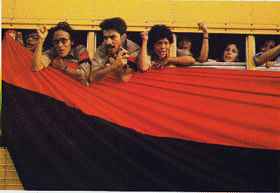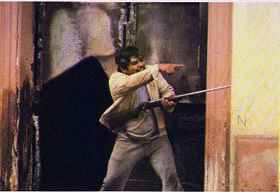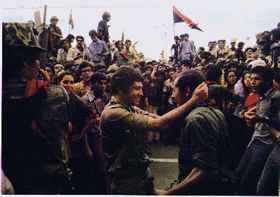





The Sandinista National Liberation Front (FSLN) or
the Sandinistas was founded in 1961, and was inspired by the Cuban revolution
led by Fidel Castro. The Sandinistas unsuccessfully tried to organize peasant
support in the Central Highlands of Nicaragua. However the group only began
to gather power in 1977 after the death of their main theoretician Carlos
Fonseca and the following spilt into three factions. Marxism was the main
focus of two of these factions; the Prolonged People’s War wanted to utilize
peasant support, the Proletarian Tendency favored the urban workers as
support, and the final faction, the Insurrectionist. (Gilbert, 63) After
the emergence of the Insurrectionists as a dominant faction the FSLN was
able to unite all people who were against the Somoza Dynasty. The Sandinistas
now had the support of the working class, the poor, the peasants, and many
middle-class citizens along with politically active Christians.
The FSLN came to power July 19, 1979 and set
up the Governing Junta of National Reconstruction (JGRN). The JGRN was
an executive body that originally had five members and then shrunk to three.
In 1980 the FSLN had also established a legislative body, the Council of
State. Instead of being elected by geographical elections, members were
participants in different groups in society; examples are businesses, military,
and labor.
The FSLN first wanted to restore the economy
in Nicaragua. Under the Agrarian Reform Law all land owned by the Samoza
government and its supporters was consolidated and nationalized. This was
2000 farms, over 20% of the arable land in Nicaragua. All financial institutions
were also nationalized due to the fact that they were all facing bankruptcy.
A third goal of the Sandinista government
was to end human right violations. Thomas Borge, Minister of the Interior
wanted to end all brutality and those held as political prisoners were
given a trial and prisoners were not allowed to be treated cruelly. In
the first two year that the Sandinista were in power human rights were
improved greatly in Nicaragua.